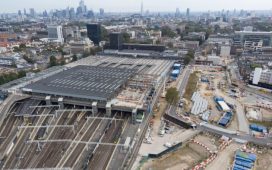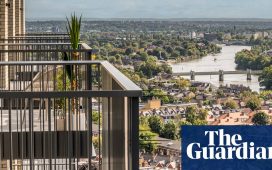Barratt Developments, the UK’s biggest housebuilder, has signalled a recovery in trading at the start of the year, although its chief executive warned against “getting carried away” given the affordability constraints on first-time buyers.
The company reported “a modest uplift” in reservations in January, attributing it to expectations of monetary easing and cooling energy prices.
“Whilst we have seen some early signs of improvement in current trading during January, we will need to see continued momentum over the coming months before we can be confident that these challenging trading conditions are easing,” Barratt said on Wednesday in a trading update alongside its interim results.
The signs of improvement in a tough housing market sparked a mini-rally among UK housebuilders, with shares in Barratt, Persimmon, Bellway and Redrow all up about 2 per cent in morning trading, outpacing the wider market.
The UK housing sector was dealt a severe blow by the ill-fated “mini” Budget last year, which sent mortgage rates sharply higher amid a generally weaker economic backdrop. House prices have fallen for five consecutive months, down another 0.6 per cent between December and January.
“We need some stability, and January is giving us [a] platform, but we shouldn’t get carried away,” said Barratt’s chief executive David Thomas. “It’s not some complete reversal of fortune.”
He said the smaller falls in month-to-month prices, compared with the double-digit predictions following the “mini” Budget, were making it easier for buyers. “I think that helps a lot in terms of consumer confidence particularly for the first-time buyer,” he told analysts on an earnings call.
Thomas told analysts it remained “very early days” and highlighted buyer affordability, which remains significantly worse than the long-term average.
Barratt’s reservation rate for homes in the six months to December fell 44 per cent compared with the same period in the previous year. Revenue, though, rose to £2.8bn from £2.2bn.
Barratt said “political and economic uncertainty” and “rapid and significant” changes in mortgage rates had damped homebuyer confidence and reduced the affordability of homes.
The housebuilder said the benefit of underlying house price inflation was “largely offset” by rising building costs. But inflation was slowing in materials costs, and timber prices were falling, while there were signs of a softening in labour costs, it added.
Thomas said this was putting “downward pressure” on its guidance of a 9-10 per cent rise in build costs.
Barratt, which built 8,626 homes in the half year, said it expected to complete 16,500-17,000 homes in its 2023 financial year.
Analysts at Peel Hunt said the improved sales activity was “clearly helpful, but it remains too early to be convincing just yet”. Barratt’s shares are down a quarter over the past 12 months.











